The Case of the Caroline
The Case of the Caroline is a letter written by Arthur Conan Doyle first published in the The Times on 28 november 1904, and in the USA press of the same day.
Editions
- in The Times (28 november 1904 [UK])
- in The New-York Times (28 november 1904 [US]) as Conan Doyle Hits Britain
- in The Chicago Tribune (28 november 1904 [US]) as England False to Her Allies
- in The St. Louis Republic (28 november 1904 [US]) as Gives Warning to English
- in The Sun (Baltimore) (29 november 1904 [US]) as Perfidious Albion: Conan Doyle Fears England is Playing False to Japs
The Case of the Caroline (The Times)
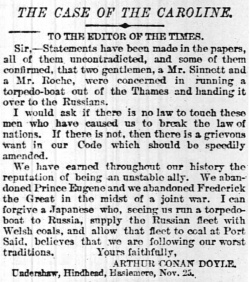
TO THE EDITOR OF THE TIMES.
Sir, — Statements have been made in the papers, all of them uncontradicted, and some of them confirmed, that two gentlemen, a Mr. Sinnett and a Mr. Roche, were concerned in running a torpedo-boat out of the Thames and handing it over to the Russians.
I would ask if there is no law to touch these men who have caused us to break the law of nations. If there is not, then there is a grievous want in our Code which should be speedily amended.
We have earned throughout our history the reputation of being an unstable ally. We abandoned Prince Eugene and we abandoned Frederick the Great in the midst of a joint war. I can forgive a Japanese who, seeing us run a torpedo-boat to Russia, supply the Russian fleet with Welsh coals, and allow that fleet to coal at Port Said, believes that we are following our worst traditions.
Yours faithfully,
ARTHUR CONAN DOYLE.
Undershaw, Hindhead, Haslemere, Nov. 25.
Conan Doyle Hits Britain (The New-York Times)
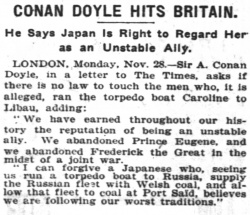
He Says Japan Is Right to Regard Her as an Unstable Ally.
LONDON. Monday, Nov. 28. — Sir A. Conan Doyle, in a letter to The Times, asks if there is no law to touch the men who, it is alleged, ran the torpedo boat Caroline to Libau, adding:
"We have earned throughout our history the reputation of being an unstable ally. We abandoned Prince Eugene, and we abandoned Frederick the Great in the midst of a joint war.
"I can forgive a Japanese who, seeing us run a torpedo boat to Russia, supply the Russian fleet with Welsh coal, and allow that fleet to coal at Port Said, believes we are following our worst traditions."
England False to Her Allies (The Chicago Tribune)
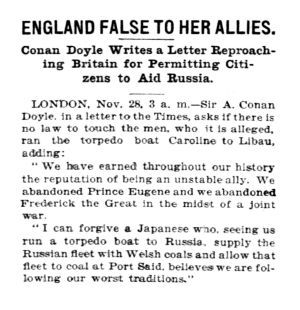
Conan Doyle Writes a Letter Reproaching Britain for Permitting Citizens to Aid Russia.
LONDON, Nov. 28. 3 a.m. — Sir A. Conan Doyle, in a letter to the Times, asks if there is no law to touch the men, who it is alleged, ran the torpedo boat Caroline to Libau, adding:
"We have earned throughout our history the reputation of being an unstable ally. We abandoned Prince Eugene and we abandoned Frederick the Great in the midst of a joint war.
"I can forgive a Japanese who, seeing us run a torpedo boat to Russia, supply the Russian fleet with Welsh coals and allow that fleet to coal at Port Said, believes we are following our worst traditions."
Gives Warning to English (The St. Louis Republic)
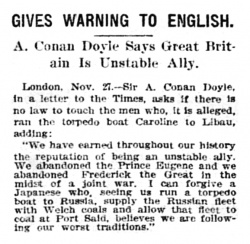
A. Conan Doyle Says Great Britain Is Unstable Ally.
London, Nov. 27. — Sir A. Conan Doyle, in a letter to the Times, asks if there is no law to touch the men who, it is alleged, ran the torpedo boat Caroline to Libau, adding:
"We have earned throughout our history the reputation of being an unstable ally. We abandoned Prince Eugene and we abandoned Frederick the Great in the midst of a joint war. I can forgive a Japanese who, seeing us run a torpedo-boat to Russia, supply the Russian fleet with Welsh coals, and allow that fleet to coal at Port Said, believes that we are following our worst traditions."
Perfidious Albion (The Sun (Baltimore))
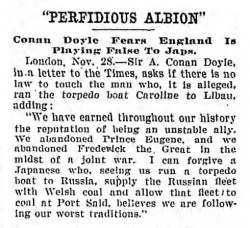
Conan Doyle Fears England Is Playing False To Japs.
London, Nov. 28. — Sir A. Conan Doyle, in a letter to the Times, asks if there is no law to touch the man who, it is alleged, ran the torpedo boat Caroline to Libau, adding:
"We have earned throughout our history the reputation of being an unstable ally. We abandoned Prince Eugene, and we abandoned Frederick the Great in the midst of a joint war. I can forgive a Japanese who, seeing us run a torpedo boat to Russia, supply the Russian fleet with Welsh coals, and allow that fleet to coal at Port Said, believes that we are following our worst traditions."